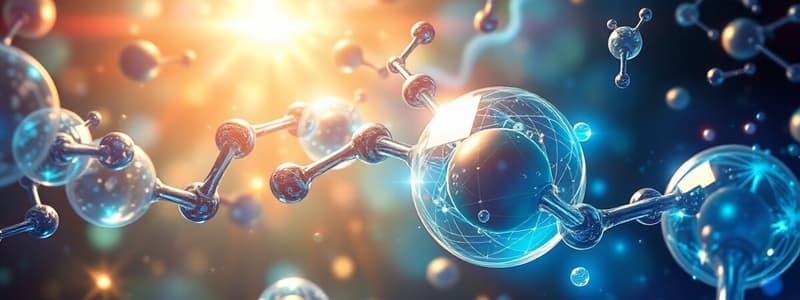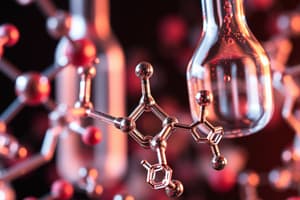Podcast
Questions and Answers
What is biochemistry primarily concerned with?
What is biochemistry primarily concerned with?
- The study of galaxies and astronomical phenomena
- The classification of minerals and their properties
- The study of ancient civilizations and their practices
- The connection between living organisms and chemical processes (correct)
Which biomolecule is NOT mentioned as a major type of biological molecule?
Which biomolecule is NOT mentioned as a major type of biological molecule?
- Proteins
- Carbohydrates
- Nucleic acids
- Vitamins (correct)
What is the term for the biochemical reaction that involves the gain of electrons?
What is the term for the biochemical reaction that involves the gain of electrons?
- Phosphorolysis
- Oxidation
- Hydrolysis
- Reduction (correct)
Which of the following processes involves the removal of carbon dioxide?
Which of the following processes involves the removal of carbon dioxide?
What concept is NOT part of the historical breakthroughs in biochemistry in the 19th century?
What concept is NOT part of the historical breakthroughs in biochemistry in the 19th century?
Who is credited with the total synthesis of urea that marked a breakthrough in biochemistry?
Who is credited with the total synthesis of urea that marked a breakthrough in biochemistry?
What role did Louis Pasteur play in the development of biochemistry?
What role did Louis Pasteur play in the development of biochemistry?
In which year did Edward Buchner make significant contributions to enzyme research?
In which year did Edward Buchner make significant contributions to enzyme research?
What principle was reported by Mendel in 1869?
What principle was reported by Mendel in 1869?
Who proposed the term 'enzyme'?
Who proposed the term 'enzyme'?
What significant relationship did Emil Fischer demonstrate?
What significant relationship did Emil Fischer demonstrate?
Which metabolic pathway was first elucidated during the first half of the 20th century?
Which metabolic pathway was first elucidated during the first half of the 20th century?
What was the outcome of Beadle and Tatum's experiments on Neurospora?
What was the outcome of Beadle and Tatum's experiments on Neurospora?
Who is credited with the discovery of the structure of DNA in 1953?
Who is credited with the discovery of the structure of DNA in 1953?
Which phenomenon did Snell contribute to?
Which phenomenon did Snell contribute to?
What contribution did Frederick Sanger make to the field of biochemistry?
What contribution did Frederick Sanger make to the field of biochemistry?
What is the general formula for alkanes?
What is the general formula for alkanes?
Which functional group characterizes alcohols?
Which functional group characterizes alcohols?
What type of bond do alkenes contain?
What type of bond do alkenes contain?
Which of the following compounds is an example of a ketone?
Which of the following compounds is an example of a ketone?
Which statement correctly describes a benzene ring?
Which statement correctly describes a benzene ring?
What is the characteristic suffix for aldehydes?
What is the characteristic suffix for aldehydes?
What type of compounds are classified as saturated hydrocarbons?
What type of compounds are classified as saturated hydrocarbons?
Which functional group is responsible for the sour taste in citrus fruits?
Which functional group is responsible for the sour taste in citrus fruits?
Flashcards are hidden until you start studying
Study Notes
Biochemistry
- Biochemistry is the study of how chemistry applies to living organisms.
- Biomolecules are molecules that are found in living organisms, and are necessary for maintaining life.
- Major biomolecule types include carbohydrates, lipids, proteins, and nucleic acids.
Biochemical Reactions
- Oxidation involves the loss of electrons, the gain of oxygen, or an increase in oxidation number.
- Reduction involves the gain of electrons, the gain of hydrogen, or a decrease in oxidation number.
- Hydrolysis is the cleavage of a molecule into two parts through the addition of a water molecule.
- Phosphorolysis involves the splitting of a bond through the addition of phosphoric acid.
- Decarboxylation is the loss of carbon dioxide.
- Deamination is the removal of an amino group.
- Transamination is the transfer of an amino group from one molecule to another.
History of Biochemistry
- The 19th century saw crucial developments in biology, including the cell theory, Mendelian inheritance, and Darwin's theory of evolution.
- Friedrich Wöhler's synthesis of urea from inorganic compounds was a major breakthrough, demonstrating that organic compounds could be produced synthetically.
- Louis Pasteur highlighted the importance of enzymes in chemical reactions.
- Edward Buchner extracted enzymes from yeast cells, demonstrating that fermentation could occur outside of living cells.
- Emil Fischer demonstrated the specificity of enzymes and described the lock-and-key model of enzyme-substrate interactions.
- James Sumner established the protein nature of enzymes by isolating and crystallizing urease.
- The glycolytic pathway was elucidated in the first half of the 20th century by Embden and Meyerhof.
- Hans Krebs described the citric acid and urea cycles in the 1930s and 1940s.
- Fritz Albert Lipmann identified the role of ATP in biological systems.
- Beadle and Tatum discovered that mutations in genes affected enzymes in organisms, suggesting a one-gene-one-enzyme relationship.
- Watson and Crick described the structure of DNA in 1953, followed by the discovery of DNA polymerase by Kornberg in 1956. These were pivotal discoveries in the field of molecular biology.
- Frederick Sanger's work on protein and nucleic acid sequencing led to significant developments in these areas.
- Nirenberg, Khorana, and Ochoa identified the genetic code words for amino acids.
- Snell's work on recombinant DNA research led to the development of genetic engineering.
Organic Chemistry
- Organic chemistry is the study of carbon-containing compounds.
- Organic chemistry is distinct from inorganic chemistry, which typically focuses on compounds that do not include carbon-hydrogen bonds, like salts, metals, and minerals.
Hydrocarbons
- Hydrocarbons are the simplest organic compounds, containing only carbon and hydrogen atoms.
- All hydrocarbons contain only carbon and hydrogen atoms.
- Different types of hydrocarbons are distinguished by their structure:
- Alkanes: Contain only single bonds, have a general formula of CnH2n+2, and are saturated.
- Alkenes: Contain at least one double bond.
- Alkynes: Contain at least one triple bond.
- Aromatic hydrocarbons: Contain at least one benzene ring. They are more stable than expected due to resonance bonding.
Functional Groups
- Functional groups are specific parts of a molecule that give it distinct chemical properties and reactivity.
- Key functional groups include:
- Alcohol: Contains a -OH group, often makes the molecule more polar and soluble in water.
- Aldehyde: Contains a carbonyl group (C=O) with a hydrogen atom attached.
- Ketone: Contains a carbonyl group with two other carbon atoms attached.
- Carboxylic acid: Contains a carboxyl group (C=O-OH).
- Ester: Contains a carbonyl group attached to an oxygen atom and then another carbon atom.
- Ether: Contains an oxygen atom bonded to two other carbon atoms.
- Amine: Contains a nitrogen atom bonded to one or more carbon atoms.
- Alkyl halide: Contains a halogen atom (F, Cl, Br, or I) attached to a carbon atom.
Representation in Organic Chemistry
- Molecular formula: Shows the types and numbers of atoms in a molecule.
- Structural formula: Shows the arrangement of atoms and the bonds between them.
- Condensed structural formula: A simplified representation of the structural formula.
Studying That Suits You
Use AI to generate personalized quizzes and flashcards to suit your learning preferences.




